The theory of TCM constitution posits that one’s constitution reflects the potential trends of disease occurrence and susceptibility to illness. Therefore, to nurture life and focus on health, it is essential to understand one’s constitution for better identification and regulation.
What is Phlegm-Damp Constitution
Individuals with a phlegm-damp constitution typically exhibit obesity, particularly with a round and soft abdomen, where the waist circumference exceeds normal limits. They tend to dislike exercise, feel heavy, and do not engage in physical activities. Their faces and foreheads are often oily, and they frequently sweat, feeling sticky and uncomfortable after perspiring. Severe snoring during sleep is also common. The presence of these symptoms indicates a typical phlegm-damp constitution.
People with a phlegm-damp constitution have a slow metabolism, leading to the accumulation of phlegm and dampness in the body, resulting in internal “garbage” buildup. Besides obesity, they are also prone to the “four highs” (hypertension, hyperglycemia, hyperlipidemia, and high uric acid), sleep apnea, coronary heart disease, stroke, dementia, polycystic ovary syndrome in women, infertility, decreased libido, eye bags, and chloasma, as well as prostate enlargement and semen liquefaction issues in men.
5 Characteristics of Phlegm-Damp Constitution
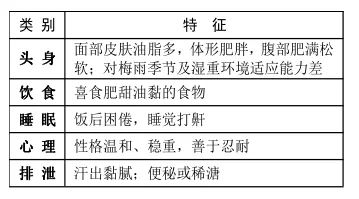
01Body Shape
Individuals with a phlegm-damp constitution typically present with abdominal obesity, characterized by soft and loose fat in the abdomen. This is due to the accumulation of “garbage” in the body, which manifests as oily skin on the face and obesity in body shape. Due to the excess phlegm and dampness, they may feel uncomfortable and struggle to adapt during rainy weather (such as the plum rain season in southern regions).
At a wedding banquet, I encountered a chubby young man around 20 years old. At the table, he indulged in various greasy meats and pig knuckles. I later learned that he had a good appetite since childhood, with a record of consuming two large pig knuckles and several bowls of rice in one meal. When dining out, he insisted on choosing the dishes, as others might order too lightly, leaving him hungry. People with a phlegm-damp constitution have a good appetite and enjoy rich, fatty, sweet, and oily foods, which accumulate as greasy fat in the body, leading to an inability to clear the “garbage” effectively.
02
Sleep
Individuals with a phlegm-damp constitution are prone to loud snoring during sleep, often described as “thunderous.” This is especially true for those weighing over 90 kg, who may experience breathing difficulties during sleep, known medically as “sleep apnea syndrome,” which can be fatal. Additionally, those with a phlegm-damp constitution often have poor digestive function, leading to drowsiness after meals. It can be said that they tend to feel sleepy and enjoy sleeping, but once asleep, they snore and experience sleep apnea, causing concern.
03
Psychological State
Individuals with a phlegm-damp constitution generally have a mild temperament, are steady in their actions, and have a good temper. A phrase that aptly summarizes their personality traits is “steady as Mount Tai.”

04Excretion
Li, a first-year middle school student, dislikes physical education the most. Each class, the teacher insists that Li “needs to exercise more due to his weight,” requiring him to run a lot, which makes him sweat profusely, leaving him feeling sticky and uncomfortable. This often affects his learning efficiency in the next class, causing him distress. Individuals with a phlegm-damp constitution tend to sweat in a sticky manner, and their stools may be loose and unformed. Some may also experience constipation due to phlegm-damp obstructing intestinal peristalsis.
How to Regulate Phlegm-Damp Constitution
For those with a phlegm-damp constitution, the primary regulation method focuses on resolving phlegm and eliminating dampness while strengthening the spleen and aiding transportation.
1
Dietary Regulation
Individuals with a phlegm-damp constitution should choose foods that strengthen the spleen and aid transportation, as well as those that resolve dampness and phlegm. They should avoid fatty, sweet, oily, and sticky foods. Meals should not be overly full; eating until 70% full is recommended, and binge eating or eating too quickly should be avoided. Suitable aquatic products include: carp, crucian carp, bass, kelp, jellyfish, and clams. Grains and legumes include: lentils, coix seeds (Yi Yi Ren), adzuki beans (Chi Xiao Dou), and yam (Shan Yao). Fruits and vegetables include: winter melon, lotus leaves, white radish, ginger, shepherd’s purse, and nori.
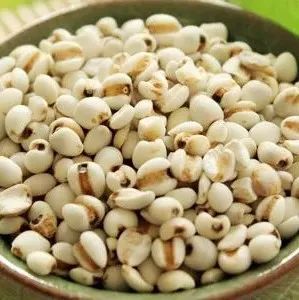
Coix Seeds (Yi Yi Ren)
Cool in nature, sweet and bland in taste, entering the spleen, lung, and kidney meridians, it has the effects of promoting urination, strengthening the spleen, dispelling dampness, and clearing heat and pus. Due to its mild action and slight coldness, it does not harm the stomach and benefits the spleen without being greasy.

Carp (Li Yu)
Sweet in taste, neutral in nature, entering the spleen and kidney meridians, it has the effects of tonifying the spleen, strengthening the stomach, promoting urination, and reducing swelling. According to the “Compendium of Materia Medica,” “Carp is particularly effective in promoting urination, thus alleviating swelling, jaundice, beriberi, cough, and damp-heat diseases, cooking it helps to dispel water retention and promote urination.”
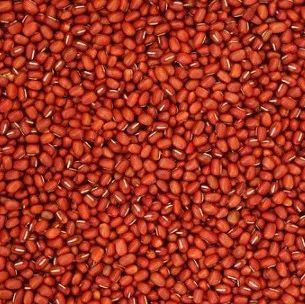
Lentils (Bian Dou)
Sweet in taste, neutral in nature, entering the spleen and stomach meridians, it has the effects of strengthening the spleen and stomach, dispelling summer heat, and transforming dampness. It enters the Taiyin Qi aspect, unblocking the three burners, and can transform clarity and descend turbidity, thus specifically treating diseases of the middle palace, dispelling summer heat and dampness, and detoxifying. Its soft shell and black color are slightly cool, but they can be consumed and also regulate the spleen and stomach.

Adzuki Beans (Chi Xiao Dou)
Neutral in nature, sweet and sour in taste, entering the heart and liver meridians, it has the effects of promoting urination, reducing swelling, and detoxifying. Adzuki beans have laxative, diuretic, and swelling-reducing properties, and can detoxify and relieve intoxication. They are suitable for those with a phlegm-damp constitution and those prone to edema.
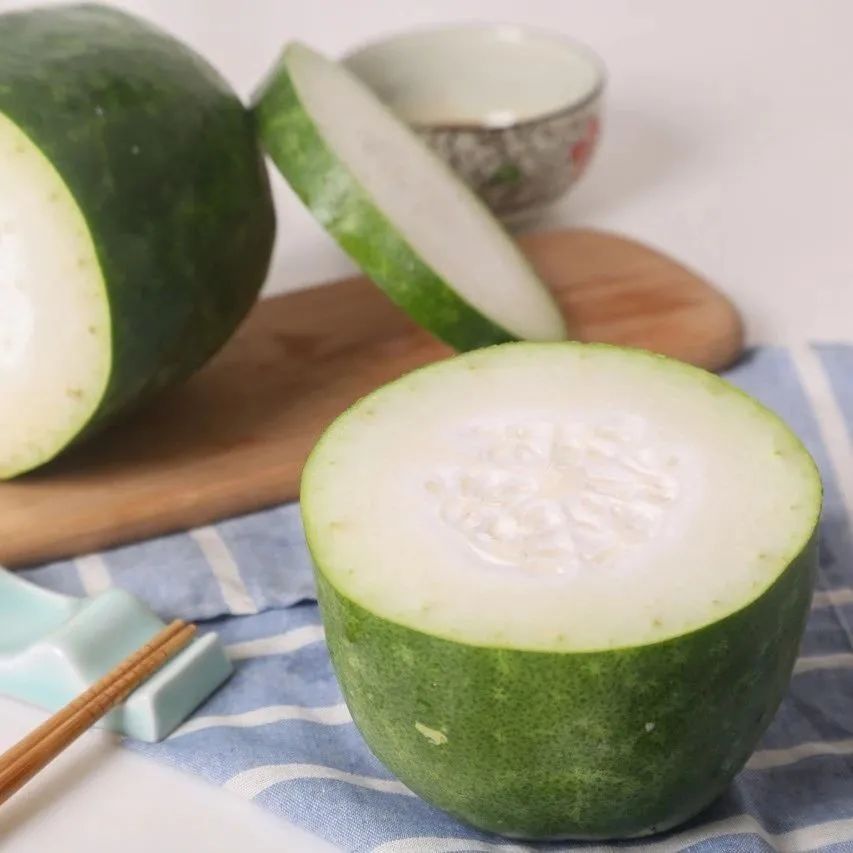
White Radish (Bai Luobo)
Cool in nature, sweet in taste, entering the lung and stomach meridians, it has the effects of promoting digestion, transforming accumulation, clearing heat, transforming phlegm, and relieving qi stagnation. Modern studies have found that regular consumption can lower blood lipids and blood pressure, aiding in weight loss. It is suitable for those with a phlegm-damp constitution and obesity.

Winter Melon (Donggua)
Sweet and bland in taste, cool in nature, entering the lung, large intestine, and bladder meridians, it functions to promote urination, reduce swelling, transform phlegm, and lower lipids. Winter melon not only has anti-aging effects but also aids in weight loss. It is suitable for those with a phlegm-damp constitution who experience eyelid swelling and obesity.
2
Examples of Medicinal Dishes
 Yam and Winter Melon Soup
Yam and Winter Melon Soup
【Ingredients】50g yam, 150g winter melon.
【Preparation】Place yam and winter melon in a pot and simmer on low heat for 30 minutes, seasoning before serving.
【Effects】Strengthens the spleen, benefits qi, and promotes urination. Suitable for those with a phlegm-damp constitution, especially those with simple obesity.
 Coix Seed Porridge
Coix Seed Porridge
【Ingredients】50g raw coix seeds, 60g japonica rice.
【Preparation】Combine raw coix seeds and japonica rice in a pot, boil on high heat, then simmer for 2 hours, adding sugar to taste.
【Effects】Eliminates dampness, transforms phlegm, strengthens the spleen, and benefits qi. Suitable for those with a phlegm-damp constitution or those with damp-heat constitution, especially those with obesity.
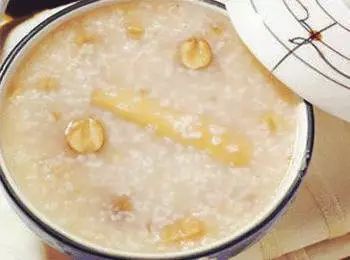
 Fat-Reducing Tea
Fat-Reducing Tea
【Ingredients】30g poria, 30g roasted coix seeds, 30g dried lotus leaves, 15g dried tangerine peel, 15g fresh hawthorn, 10g cinnamon (added last).
【Preparation】Prepare one dose daily, decoct twice, mix the liquid after straining, and store in a thermos for tea consumption at any time.
【Effects】Transforms phlegm, reduces turbidity, strengthens the spleen, and eliminates dampness. Suitable for those with phlegm-damp obesity, especially those with a tendency for high blood lipids.
 Adzuki Bean and Carp Soup
Adzuki Bean and Carp Soup
【Ingredients】1 live carp (about 800g), 50g adzuki beans, 10g dried tangerine peel, 6g chili, 6g grass fruit.
【Preparation】Scale, gill, and gut the carp; fill the carp’s belly with adzuki beans, dried tangerine peel, chili, and grass fruit, place in a bowl, add appropriate cooking wine, ginger, scallions, pepper, and a little salt, then steam until cooked.
【Effects】Eliminates dampness, transforms phlegm, promotes urination, and reduces swelling. Suitable for those with a phlegm-damp constitution who often feel chest tightness, phlegm accumulation, dizziness, and edema.
 Kombu and Seaweed Pork Rib Soup
Kombu and Seaweed Pork Rib Soup
【Ingredients】40g kombu, 40g seaweed, 500g pork ribs, 2-3 slices of ginger.
【Preparation】Wash the kombu and seaweed, soak for 30 minutes; wash the pork ribs and cut into small pieces, then place them with ginger in a clay pot, adding 3000ml of water (about 12 bowls); first boil on high heat, then simmer on low heat for 3.5 hours, seasoning with salt and a little oil.
【Effects】Softens hardness and eliminates phlegm. Suitable for those with a phlegm-damp constitution who have a tendency for elevated blood pressure and dizziness.
 Crucian Carp and Tofu Soup
Crucian Carp and Tofu Soup
【Ingredients】250g crucian carp, 250g tofu, 2 slices of ginger, scallions, cooking wine, salt, cooking oil, starch, etc.
【Preparation】Cut the tofu into thin slices and drain. Scale and gut the crucian carp, marinate with cooking wine and salt for 10 minutes. Heat oil in a pan, sauté ginger slices, then pan-fry the fish until golden on both sides, add water, and simmer for about 25 minutes, then add tofu slices, season, and thicken with starch, garnishing with scallions.
【Effects】Strengthens the spleen, eliminates dampness, harmonizes the stomach, and stimulates appetite. Suitable for those with a phlegm-damp constitution who are prone to facial swelling and edema.

3
Physical Exercise
Exercise should be sustained. Individuals with a phlegm-damp constitution tend to be overweight and easily fatigued, so they should gradually increase their exercise based on their specific conditions and maintain a long-term exercise regimen, such as walking, jogging, playing table tennis, badminton, tennis, swimming, practicing martial arts, and various suitable dances.
Those with a phlegm-damp constitution should enhance their metabolic processes and engage in prolonged aerobic exercises to gradually firm and tighten their loose flesh. Generally, warming up for about 15 minutes is recommended, then slowly increasing the intensity, with an optimal exercise duration of 1 hour. The best time for exercise is between 2:00 PM and 4:00 PM, when yang energy is at its peak, and the exercise environment should be warm and pleasant.
Individuals with a phlegm-damp constitution typically have higher body weight, so they should pay attention to their exercise rhythm and gradually increase their training intensity to ensure safety. Swimming is particularly effective for improving cardiovascular function.
4
Living and Care Adjustments
Avoid dampness in daily life. During rainy seasons, it is important to avoid dampness invasion, reducing outdoor activities in humid and cold weather, and avoiding exposure to cold rain. The living environment should be warm and dry, rather than cold and damp.
Clothing should be breathable and moisture-wicking, primarily made from natural fibers such as cotton, linen, and silk, which facilitate sweat evaporation and eliminate internal dampness, while also ensuring warmth.
Individuals with a phlegm-damp constitution should frequently take hot baths, to the extent that the skin turns slightly red and they sweat.
Those with a phlegm-damp constitution tend to be sleepy, so they should appropriately reduce sleep duration and avoid excessive comfort, resisting the temptation to stay in bed. When sleeping, pillows should not be too high to prevent worsening snoring.
Engaging in outdoor activities is encouraged to activate bodily functions. Individuals with a phlegm-damp constitution should participate in group outings, hiking, and other activities to increase outdoor exercise, promoting yang energy and facilitating qi flow. Regular monitoring of blood sugar, blood lipids, and blood pressure is also recommended.

5
Acupuncture and Tuina
Selected Points: Fenglong (ST40), Zusanli (ST36).
Simple Point Location: Fenglong is located at the midpoint of the line connecting the outer knee eye (Xiyan) and the outer ankle tip, 2 fingerbreadths lateral to the anterior crest of the tibia. The point can be accessed while sitting with the knee bent or lying supine. Zusanli is located 4 fingerbreadths below the outer knee eye, 1 fingerbreadth lateral to the edge of the tibia. The point can be accessed while sitting with the knee bent.

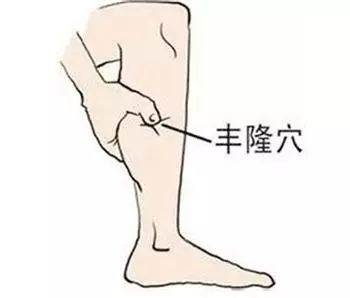
Effects: Fenglong is a point on the stomach meridian that connects with the spleen meridian, regulating the spleen and stomach, and is a key point for phlegm transformation, having the effects of dispelling dampness and phlegm. Zusanli is the lower he-sea point of the stomach, which has the effects of tonifying the spleen and stomach and transforming phlegm.
Procedure: Use gentle finger pressure, guasha, and moxibustion methods. Each acupoint should be pressed for 2-3 minutes, performed 1-2 times daily. Moxibustion should be applied for 10 minutes at each point, once daily.
6
Mental Regulation
Maintain a positive mindset, and uplifting music can invigorate. Individuals with a phlegm-damp constitution tend to have a mild temperament and are steady in their actions, often good at enduring. However, due to the internal accumulation of phlegm dampness, which obstructs yang energy, they may easily feel fatigued. Therefore, it is important to enhance physical activity, participate in social activities, and cultivate a wide range of interests and hobbies. Listening to some upbeat and lively music, such as Strauss’s waltzes, Bizet’s Carmen overture, Radetzky March, and the Erhu piece “Horse Racing,” can also be beneficial.

Editor: Jin Xiaoxin
Some images and text sourced from the internet, please delete if infringing.

